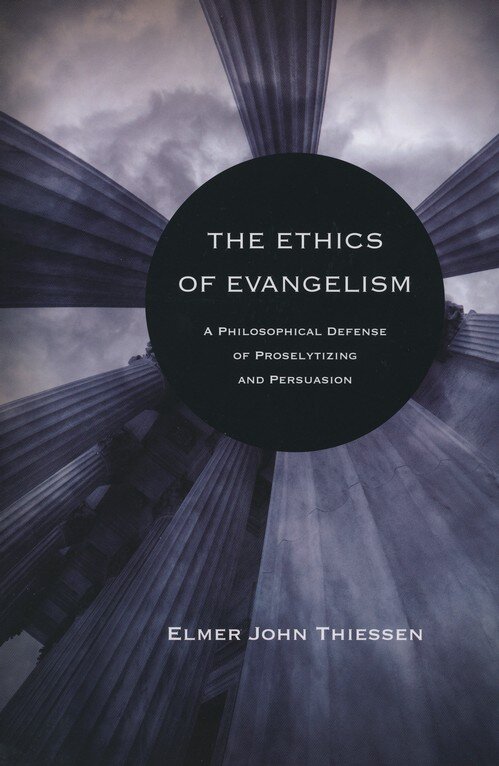Elmer J. Thiessen, The Ethics of Evangelism: A Philosophical Defense of Proselytizing and Persuasion. IVP Academic, 2011.
Referenced in: Theology and Practice of Evangelism – Evaluating-Emergent
LifeandLeadership.com Summary
This is a very interesting volume. While it is not expressly evaluating-emergent, it makes a counter-point against the idea often found in emergent circles that evangelism which emphasizes Christianity’s exclusive truth claims is “proselytizing” and as such is immoral, arrogant, coercive, or malicious. To the contrary, Thiessen argues unabashedly for proselytizing, but not just any proselytizing.
Thiessen employs his academic specialty of philosophical ethics to assess epistemological, socio-political, and current (liberal) objections to proselytizing. Next, he offers a defense of proselytizing, and offers a set of fifteen criteria for evaluating the ethics of proselytizing. He is fair and thoughtful in challenging approaches to evangelism that are offensive and disrespectful, but affirms the right to uphold that which is true and good. He believes error has no rights, but people do. And while it is important to respect people, this should not require the relativizing of truth claims. He stresses that Christians should engage those of other faith systems in such a way that shows deep respect for their human dignity and religious freedom, but is unapologetically aimed at their conversion.
For example, in chapter 5, “Liberal Objections to Proselytizing,” he argues that tolerance, at least in its current usage, was never regarded as virtuous by any of the classic systems of philosophical ethics. It was not until the Enlightenment that tolerance became virtuous, and with good effect. In its original construction, however, tolerance was a subcategory of respect of persons. It did not imply welcoming all of their ideas, but simply practicing restraint when responding to ideas one finds unacceptable. This required distinguishing between beliefs and believer. Today, however, tolerance has come to be associated primarily with beliefs, and not the persons who hold the beliefs. Thiessen says:
Today, however, this is condescendingly spoken of as mere tolerance, and it is not seen as good enough. Today a further demand is made of the tolerant person, namely, the requirement of fully accepting and even agreeing with what is different. Indeed, to disagree with someone is to be intolerant. The preferred substitute for tolerance today is mutual acceptance of each other’s ideas as equally valid. (From chapter 5, “Liberal Objections to Proselytizing”)
This is a very needful addition to the current discussions on evangelism. As one of the reviewers says, Thiessen “actually models the kind of proselytism he advocates—thoughtful, gentle, respectful and clear.”
From the Publisher
Why do religious people attempt to persuade others of their beliefs? What are the current objections to the religious practice of proselytizing? Is proselytizing an ethically defensible practice? Are there kinds of proselytizing activities that are ethically questionable?
Elmer John Thiessen responds to questions like these in an effort to provide a philosophical defense of proselytization, or religious persuasion, as an ethical practice. Thiessen examines and refutes current cultural and academic objections to religious proselytizing and offers a thorough ethics of evangelism.
Features & Benefits:
- Engages a timely, relevant cultural debate about religion in public and social life
- Examines cultural and intellectual objections to evangelism accurately and fairly
- Provides a thorough philosophical defense for public Christian practice
- Useful as a text for ethics or evangelism courses at Christian institutions
About the Author
Elmer John Thiessen recently moved to Waterloo, Ontario, after retiring from teaching philosophy and religious studies at Medicine Hat College in Alberta for over thirty-five years. His official position now is that of a “roving philosopher,” open to short-term teaching and research positions anywhere in the world. He is presently Research Professor of Education at Tyndale University College in Toronto.
Thiessen received a B.Th. degree from the Mennonite Brethren Bible College in Winnipeg, a B.A. degree from the University of Saskatchewan with a major in physics and philosophy, and an M.A. in philosophy from McMaster University, after which he spent a year of study overseas in Germany. He received his Ph.D. from the University of Waterloo in 1980, writing his dissertation on the problem of indoctrination.
***For additional information on this resource, including reviews, click the bookstore links. Check the reference at page top or the links below for resource guides on related topics.***
Related Areas
See Other Resources on Evangelism:
See Resources on Over 100 Areas of Ministry Leadership:


